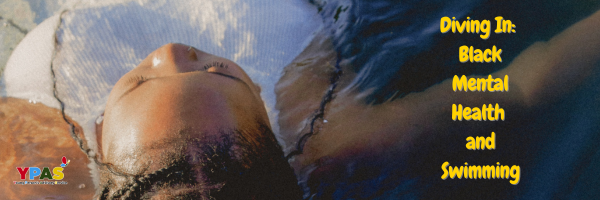
Diving In: Black Mental Health and Swimming
There’s something truly magical about that initial plunge into a pool, being submerged in that cold water. I love to swim, it’s a time of peace and tranquillity, but in my local aquatics centre all I regularly see is a sea of white faces, it’s a stark reminder of how underrepresented the Black community is in the swimming world.
A 2022 Swim England report called ‘England Swims‘ revealed that 95% of Black adults and 80% of Black children in England do not swim. This isn’t just a coincidence; it results from cultural beliefs, stereotypes, and fear. As a Black British woman who didn’t learn to swim until her thirties, I can relate.
Culturally, as someone from the Democratic Republic of Congo, swimming was not a common activity, and its benefits were not widely recognised. My mum, who didn’t know how to swim, likely didn’t want to be put in a situation where if I were to get into trouble in the water, she wouldn’t be able to help me.

I have grown up first-hand with the impact of mental health, my mum suffered from depression for a long period, which she kept secret from friends and family and sometimes even stepped away from society for a while. So I have seen the ugly side of not looking after your mental health and waiting until it gets worse to seek help.
So it is always something I am weary about, looking after my mental health and finding joyous things to do that benefit not just my body but my mind too. Also learning to dig up those cultural beliefs that ‘mental health issues’ are not real or that aren’t things we talk about. I’ve decided, regardless of my upbringing and beliefs, I will talk about my mental health and do what I can to make it better, that includes swimming and I think you should too.
Swimming has been a game-changer for my mental health. It’s a fantastic way to reduce anxiety, improve sleep, and boost overall well-being. There’s a scientific reason for this: our bodies are made up of about 60% water.
Studies have found that swimming and being around water can benefit our mental wellbeing in several ways:
- Boost Brain Health
- Cut down risk of depression
- Reduce anxiety
- Improves sleep and reduces stress
- Slows dementia and cognitive decline
Whether or not you struggle with mental health, swimming is beneficial for all, to help reduce and prevent any mental health issues.
As previously mentioned there are many reasons why those from the black and brown community don’t swim but there are organisations out there who are passionate about breaking down those barriers and obstacles to create more of an inclusive swimming world.
Swim England research found that 23.5% of Black individuals reported concerns about pool water damaging their hair, compared to only 5.2% of the national average.
Soul Cap is creative inclusive swimwear bringing inclusivity and accessibility to swimming, they create large swim caps for long and voluminous hair.

One other factor that might be preventing you from enjoying the benefits of swimming is fear. According to a Swim England survey, both those who could and couldn’t swim expressed a fear of drowning. This fear, often stemming from a lack of swimming ability and water safety knowledge, motivated four individuals to establish the Black Swimming Association (BSA) in 2020. The BSA’s goal is to address these issues within the African, Caribbean, and Asian communities.
The BSA is a non-profit organisation dedicated to diversifying the world of aquatics through education, advocacy, support, and research. They also offer swimming lessons taught by Black and Brown instructors in London and Wales. The BSA emphasises that swimming is accessible to everyone, from infants to the elderly.

Let’s challenge stereotypes and embrace the transformative power of swimming. By diving in, we’re not just taking care of our physical health; we’re also nurturing our mental well-being. It’s time to make a splash and create a more inclusive swimming community.
So, what are you waiting for? Dive in and experience the magic for yourself!
